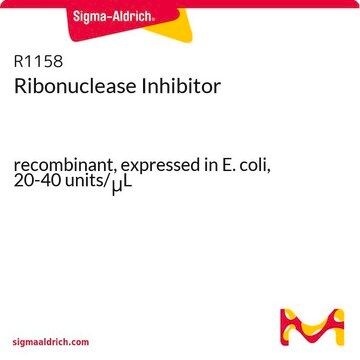R0884
T7 RNA Polymerase
recombinant, expressed in E. coli, buffered aqueous solution
Synonym(s):
RNA Polymerase T7, RNA Polymerase, T7 from E. coli HMS 174/pAR1219
About This Item
Recommended Products
recombinant
expressed in E. coli
grade
for molecular biology
form
buffered aqueous solution
mol wt
98.8 kDa
concentration
10,000-50,000 U/mL
UniProt accession no.
foreign activity
DNase and RNase, none detected
storage temp.
−20°C
Gene Information
bacteriophage T7 ... T7p07(1261050)
Looking for similar products? Visit Product Comparison Guide
General description
Components
Unit Definition
Analysis Note
related product
Storage Class Code
10 - Combustible liquids
WGK
WGK 3
Flash Point(F)
Not applicable
Flash Point(C)
Not applicable
Certificates of Analysis (COA)
Search for Certificates of Analysis (COA) by entering the products Lot/Batch Number. Lot and Batch Numbers can be found on a product’s label following the words ‘Lot’ or ‘Batch’.
Already Own This Product?
Find documentation for the products that you have recently purchased in the Document Library.
Customers Also Viewed
Our team of scientists has experience in all areas of research including Life Science, Material Science, Chemical Synthesis, Chromatography, Analytical and many others.
Contact Technical Service








